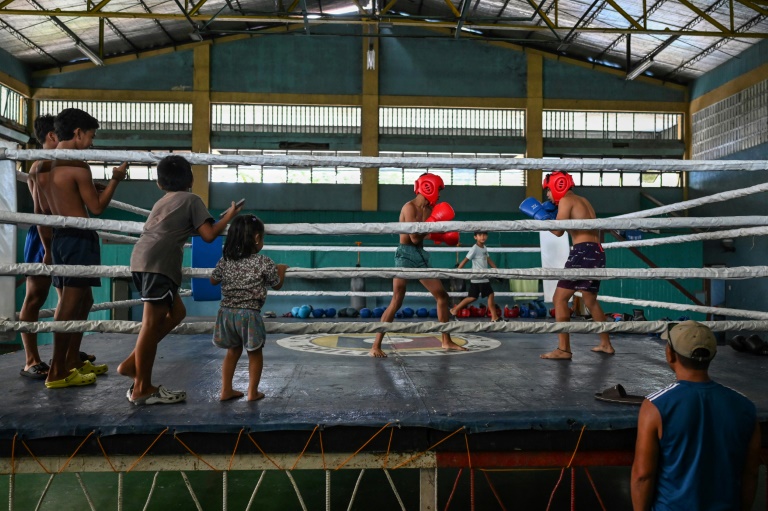
In a modest gym in central Philippines, children from poor families wear ripped shoes and worn-out head guards as they train, hustling for a dream of competing in the Olympic Games and escaping poverty.
The young boxers, aged between 10 and 18, spar after school in a gym in Bago city and sleep under the canvas of the ring at night.
Located in the sugar-producing region of Negros Island and one of the country’s most unequal cities, the city of 200,000 calls itself the “boxing capital” of the Philippines.
Of the 70 Filipino boxers who have competed in the Olympics, eight began their careers in gyms in Bago City.
There, boxers train on punching bags under the blaring of giant, old fans, seeking some relief from the oppressive tropical heat.
– “Life here is tough” –
The most recent Olympian from Bago, Roger Raddon, a light flyweight at Rio 2016, failed to qualify for the Paris Games, leaving the city eager for a new star athlete.
“Life here is tough and there are limited job opportunities,” said coach Larry Semillano, a Bago native who fought in the lightweight division at the 2000 Sydney Olympics.
Most of his 17 protégés are children of farmers, construction workers and tricycle drivers.
“The athletes believe that if they excel in sports, they will have a better life,” said Ignacio Denira, the city government’s executive assistant for sports.
“They all worship (Manny) Pacquiao,” Denira told AFP, referring to the eight-weight world champion who was also born into poverty on the southern island of Mindanao.
“I want to be called up to the national team, compete in tournaments abroad and win a medal,” AJ Vicente, 17, one of Semillano’s current promising players, told AFP.
Bago lightweight boxer Leopoldo Cantancio earned his Olympic streak by reaching the round of 16 at the 1984 Los Angeles Games. He also competed in the 1988 Seoul Olympics.
Bago athletes have since won one silver and one bronze medal at the Olympics.
Although a Philippine boxer is yet to win a gold medal, eight of the country’s 14 Olympic medals have come in boxing, including three silver and five bronze.
Semyano believes there is a “70 percent” chance that Vicente, a right-handed flyweight boxer who won a bronze medal at last year’s Philippine national championships, will eventually make the national team.
But to compete in the 2028 Los Angeles Olympics or the 2032 Brisbane Olympics, “he’ll need to eat more rice”, the coach added.
“The technique is there, what we are trying to develop now is his power,” Semillano told AFP.
– “Farming is hard work.” –
AJ’s father, Jose Vicente, 50, used to cut sugarcane for 10 pesos (about 17 cents) a day as a young man and fight in village-level bago tournaments for small prizes.
“Farming is hard work and I don’t want my son to go through the same thing,” Jose, who now works as a handyman at a local hospital, told AFP from his small wood-and-bamboo house amid sugarcane fields on the city’s outskirts.
“My father wanted to be a boxer and I decided to make his dream come true,” said his son, whose living room wall proudly displays more than a dozen boxing medals.
Coach Semillano said children from the age of seven can join the training program and that she cooks for the young boxers while she looks after her two-year-old daughter, Sydney, while the young boxers do laundry in the yard.
Last year, three Bago underage boxers coached by Semillano qualified to compete in the government’s amateur boxing pool, a crucial next step towards their Olympic ambitions.
Funded by the Bago city government, the program was launched in the mid-1960s by sports-loving Mayor Ramon Torres and came to fruition in 1992 when light flyweight Roel Velasco won a bronze medal at the Barcelona Olympics.
His younger brother, Mansueto Velasco, did even better, winning the silver medal in the light flyweight division in Atlanta in 1996.
– “There are no other girls to fight with.” –
One schoolgirl, Pristine Niche Cantancio, 11, nicknamed Junela, is a distant relative of Bagot’s first Olympic boxer. She also trains at the gym, sparring with boys as young as 10.
“I want to make my father proud by following in his footsteps in boxing,” she told AFP, referring to Cantancio, a boxer who failed to qualify for the Philippines Olympic team.
Junela put her teddy bear collection away in a cupboard and first put on a pair of boxing gloves when she was 7, said her mother, Lovely Christine Cantancio, who takes her daughter to boxing practice.
“She seems happy, but she has no one else to fight for,” LaBrie said.
Her father retired from boxing after being injured in a fight to become a full-time military soldier.
“Not all of them will become Olympians or be selected for the national team,” said Denira, the city’s sports official.
“What’s important to me is to have discipline, even if you don’t succeed in life.
“The real purpose of sports is to develop people morally and spiritually.”
Ingredients of dh/cgm

